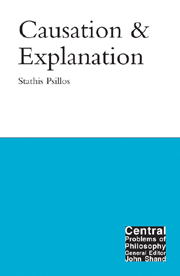10 - Explanation of laws
from III - Explanation
Summary
Explanatory ascent
Necessitarians (see Chapter 6) insist that Humeans cannot adequately show how laws explain their instances. Armstrong, for instance, notes that when we explain why all observed Fs have been Gs by stating that All Fs are Gs, we “explain something by appealing to a state of affairs part of which is the thing to be explained” (1983: 40). “But”, he adds, “a fact cannot be used to explain itself”. His point is that a generalization A: “All Fs are Gs” is equivalent to the conjunction of the following two statements: A1: “All observed Fs are Gs” and A2: “All unobserved Fs are Gs”. So, when we try to explain A1 by reference to A, we presuppose A1 and hence we cannot explain it. Necessitarians solve this problem by what Earman (1984: 215) has called an “ontological ascent”: the further fact that F-ness implies G-ness explains why all Fs are Gs as well as why all observed Fs have been Gs.
Innocuous though it may sound, this point is very important. Where necessitarians inflate their ontology to explain why regularities hold, Humeans must find a different explanation. They should engage in what Earman (ibid.) called “ascent of explanatory level”. Ultimately, it should be further regularities that explain lower-level regularities and their observed patterns. If Humeans succeed in doing that, they can avoid the unwanted to them ontological ascent.
Information
- Type
- Chapter
- Information
- Causation and Explanation , pp. 263 - 280Publisher: Acumen PublishingPrint publication year: 2002
